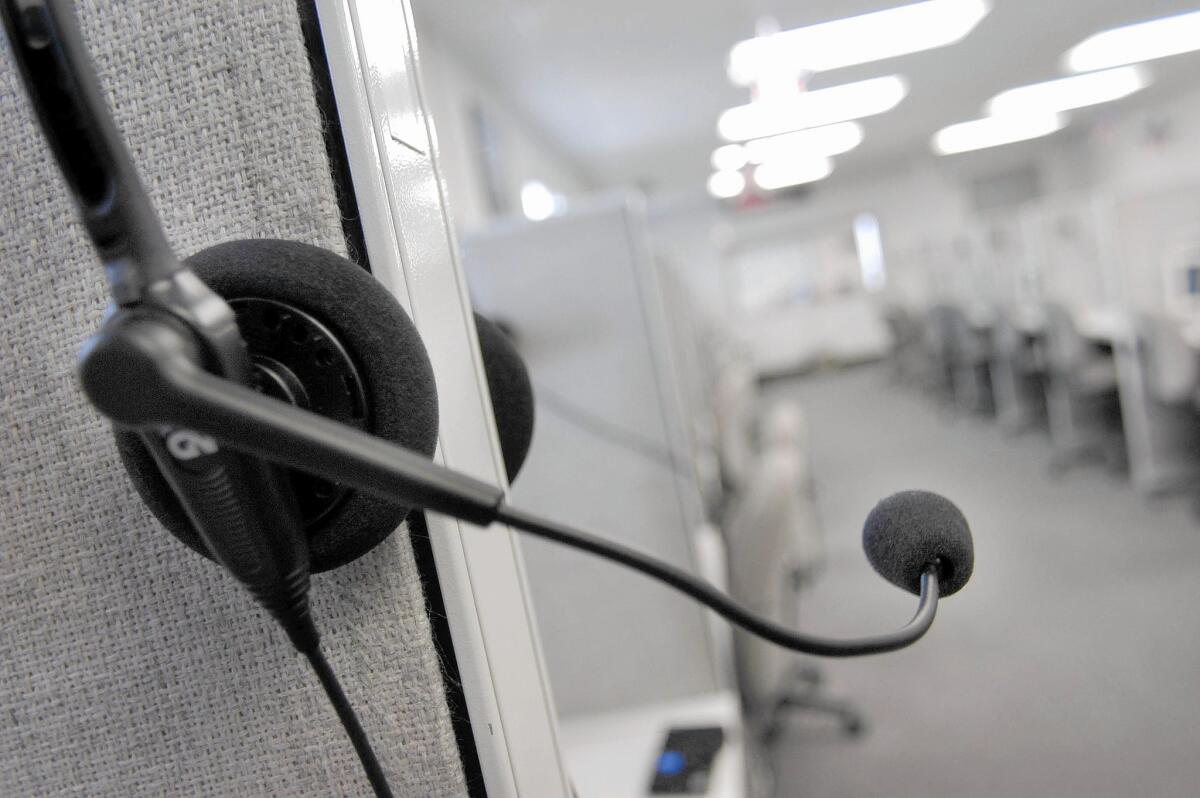Unprescribed medical tests are themselves a sign of trouble

Telemarketers are bad enough. Telemarketers that prey on unsuspecting seniors are worse.
A telemarketer that takes advantage of an 88-year-old woman with dementia — well, that’s a whole other breed of barracuda.
Long Beach resident David Eckhous told me the other day about his mother’s experience with an Ohio company called Life Line Screening, which offers unprescribed medical tests that “can help detect hidden health issues before they become a problem.”
You may have heard of these guys. They’re aggressive marketers, trawling for customers with frequent phone and direct-mail solicitations. Peggy Fleming, the former Olympic figure-skating star, was a former pitchwoman.
As for the efficacy of such services, a 2012 article in the journal Clinical Chemistry warned that the direct-to-consumer screening industry “offers unproven medical testing, provides testing for unapproved indications and uses suspect advertising claims.”
The pharmaceutical industry is similarly criticized for its prominent TV marketing of drugs. The upshot, in many cases, is to spook consumers into seeking treatments they might not need or be able to afford.
Eckhous, 61, said his mother, Jacqueline, was diagnosed with dementia several years ago. She was denied a driver’s license a year and a half ago because of her diminished capacity.
“She’s incapable of managing her affairs,” Eckhous said. “She’ll call me sometimes and say someone just told her on the phone that she needs something. I’ll say, ‘It’s telemarketing, Mom.’ She thinks the call is from someone she knows.”
He said his mother, living in Detroit, was first called by Life Line Screening in late 2013.
“They told her there are all kinds of problems that can be missed by a regular doctor,” Eckhous said. “They said if there was a problem, they’d find it.”
His mother rushed right out for a $149 Life Line test. No problems were found.
A caretaker looking after Eckhous’ mother subsequently spotted the Life Line bill and phoned the company. Explaining that her patient has dementia, she requested that Life Line not contact Eckhous’ mother again.
Eckhous said the caretaker was given no reason to think this request would be ignored. But it was.
About a year later, Eckhous said, his mother’s accountant got in touch to say he’d received another bill from Life Line. Eckhous’ mother once again had paid $149 for a screening. Once again, no problems were found.
Eckhous phoned Life Line and asked what the heck was going on. Why were they still contacting his mother?
A supervisor, he said, replied that “they were just looking out for her welfare.”
This whole situation smacks of elder abuse, which the Federal Trade Commission calls “a public health crisis.” At best, Life Line appears incompetent. At worst, the company seems to be deliberately taking financial advantage of an 88-year-old woman with a serious illness.
Joelle Reizes, a Life Line spokeswoman, looked into the matter and said no one at the company had phoned Eckhous’ mother before her second screening.
“We are sorry the son is so upset,” she said. “We always want to help customers and families.”
If so, Life Line may want to take a closer look at how it does business.
Reizes acknowledged that, although there were no calls last year to Eckhous’ mother, “she did receive three letters in the mail from us over the year.” The letters, Reizes said, were reminders that it was time to schedule another screening, which Eckhous’ mother did.
The reason Life Line didn’t honor the caretaker’s request for the company to stay away, Reizes said, is because only a patient or someone with power of attorney can ask that no more calls be received.
It was just a coincidence, she said, that Life Line updated its records last year with a Michigan do-not-call list that included the number of Eckhous’ mother.
But that didn’t include letters. Reizes said that just because someone is placed on the company’s internal do-not-call list, “do-not-call is separate from do-not-mail.”
Apparently you have to make a separate request to stop letters from coming. If you don’t think to do so, Life Line will keep sending them as if everything’s hunky-dory.
These are reprehensible corporate practices, indicative of a company more determined to keep piling up money than in protecting a patient’s well-being.
And it’s not just Life Line. What happened to Eckhous’ mother highlights broader problems with direct-to-consumer marketing of healthcare.
The United States, for instance, is one of only two Western countries — the other being New Zealand — that allow drug companies to hawk prescription meds.
These multibillion-dollar marketing efforts have caused a big rise in prescription-drug usage. A 2012 study published by the American Psychological Assn. found that Americans’ use of heavily advertised psychotropic drugs, including the antidepressant Prozac and the sleeping aid Lunesta, rose 22% from 2001 to 2010.
Medical-screening companies, meanwhile, “market primarily by targeting consumer fear about undetected disease,” according to a 2011 article in the Journal of the American Medical Assn.
“Beyond the suspect ethics of preying on consumer fears,” it said, “some screening tests are suspect on evidence-based grounds.”
The tests also can circumvent power-of-attorney safeguards. Since no doctor is involved in arranging the screening, it can be obtained without family members knowing it.
Reizes stressed that Life Line wasn’t at fault in the case of Eckhous’ mother. “Please make sure you acknowledge that we did nothing wrong,” she told me.
Not sure I can do that. But I can pass along that Eckhous said he was told by Reizes on Thursday that Life Line would refund his mother’s $149 for the second screening.
David Lazarus’ column runs Tuesdays and Fridays. He also can be seen daily on KTLA-TV Channel 5 and followed on Twitter @Davidlaz. Send your tips or feedback to david.lazarus@latimes.com.







